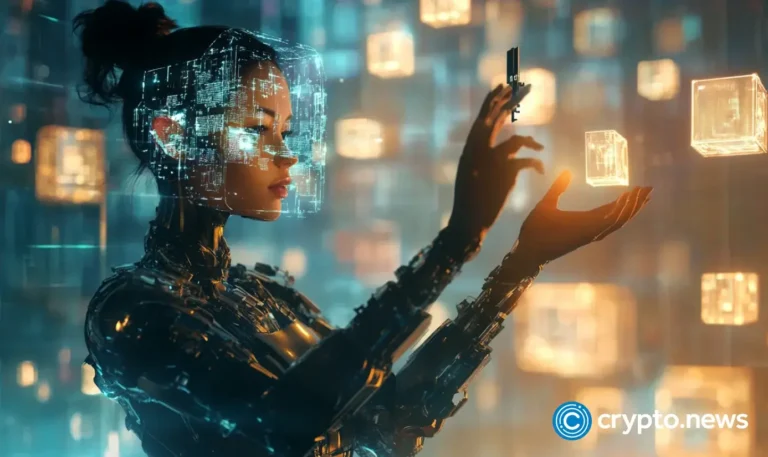Disclosure: The views and opinions expressed herein belong solely to the authors and do not represent the views and opinions of crypto.news editorials.
Artificial intelligence and blockchain, once considered separate technology trends, are rapidly merging. These diverse subsectors include everything from distributed energy and distributed physical infrastructure networks to model fine-tuning and computational infrastructure.
Some skeptics may balk at startups touting the use of AI and blockchain, two of the biggest buzzwords in business today. I believe they are simply trying to ride on the hype of both. After all, if some companies are already working on AI washing, why not go a step further and add blockchain as well?
The truth is, the intersection of AI and blockchain is more than marketing hype. As I wrote in HashKey Capital’s H1 2024 report, AI and blockchain are uniquely complementary, enabling solutions that are much greater than the sum of their parts.
Blockchain solves AI privacy issues
Imagine the amount of data you enter into ChatGPT and other similar tools every day. Multiply this by all daily active users and the number of LLM developers ingesting terabytes of data for model training. In other words, the world is entrusting vast amounts of data to AI.
Therefore, GenAI becomes a major attack vector for data breaches. For example, hackers could threaten companies by releasing their employees’ GenAI logs, just as they threaten to compromise personal data with ransomware attacks. These logs are especially sensitive given the scope and depth of the questions, content, data, and sensitive information you type into the prompts.
Fortunately, one of the key principles of blockchain is privacy. Decentralization allows users to escape the scrutiny and public scrutiny of intermediaries and other large corporations that often accompany centralized systems.
To achieve this objective, blockchain has developed several technologies that can enhance privacy, such as ZKML, OPML, and TEEML. Each has its own tradeoffs, but their implementation can go a long way toward improving both data and model privacy. By increasing security around AI, blockchain not only reduces the threat of data breaches but also fosters an all-important sense of trust for users.
Blockchain makes AI sustainable
The rise of genAI also requires vast amounts of computing power, putting a strain on the world’s energy. These demands will also grow exponentially as more individuals and businesses adopt AI, its use cases become more diverse, and AI itself becomes more powerful, such as in developing multimodal capabilities.
These demands place companies in an ethical dilemma. Businesses naturally want AI to increase productivity and efficiency, but they may reconsider using AI if it comes at the cost of negative environmental impact. This thinking is not only the right thing to do, it’s also a matter of good business. 77% of consumers prefer to patronize companies that are environmentally and socially responsible.
Blockchain can address genAI’s huge energy needs through decentralized energy. Distributed energy aims to produce and distribute energy locally and intelligently, and is a more sustainable and efficient prospect than the centralized grid. With blockchain, companies no longer have to choose between efficiency and environmental responsibility. They can envision a world improved by new innovations and make sustained progress towards that future.
Blockchain could open up AI
One of the criticisms of AI is that its greatest benefits will be concentrated in the hands of a “few people.” The minority that will benefit most from AI are model developers like OpenAI and Anthropic, and big tech companies like Meta, Amazon, Google, and Apple, which have the most data.
These critics argue that AI will enrich these players at the expense of other players. Developers can directly benefit from their models, even if they are trained on datasets that contain public data. Tech giants will have the most data on consumers, allowing them to build the most profitable use cases around AI.
This future is not ideal. AI should not be like gold or oil, where only a privileged elite can reap the maximum benefits. Fortunately, blockchain may offer a solution here as well. Because blockchain is a public ledger, organizations can use it to more easily share information such as data and models that are central to AI.
Some companies are taking advantage of this trend of information sharing via blockchain. One such company is Carv. Carv is a modular data layer that enables gaming and AI companies to better own, manage, and monetize their data. Blockchain-powered solutions like Carv create inclusion and bring the benefits of AI to individuals and organizations who may have been left out of this revolution.
world’s biggest problem
Blockchain was once criticized as a solution to a problem. With the rise of AI, blockchain is no longer a niche technology on the fringes of society. As blockchain addresses some of the challenges of AI (namely security risks, energy demands, and potential inequities), forward-thinking companies that can adopt both will enjoy a competitive advantage in the market. The world will benefit.
It will enable companies to tackle the world’s biggest problems while ensuring the privacy of their data and models. Although this task is computationally intensive, the use of distributed energy can improve sustainability. Finally, and above all, information sharing via blockchain allows us to extend the technology to more people, ultimately allowing the transformative power of AI to be more equitably distributed. And this is an obligation we all must take seriously if we are to realize the full potential of AI.
Jeffrey Hu
Jeffrey Hu is Head of Investment Research at HashKey Capital, where he monitors the trends and data that drive the industry forward. He is also a regular contributor to the Bitcoin Optech Newsletter, in an effort to make Bitcoin’s major developments more accessible to the Chinese-speaking community.


